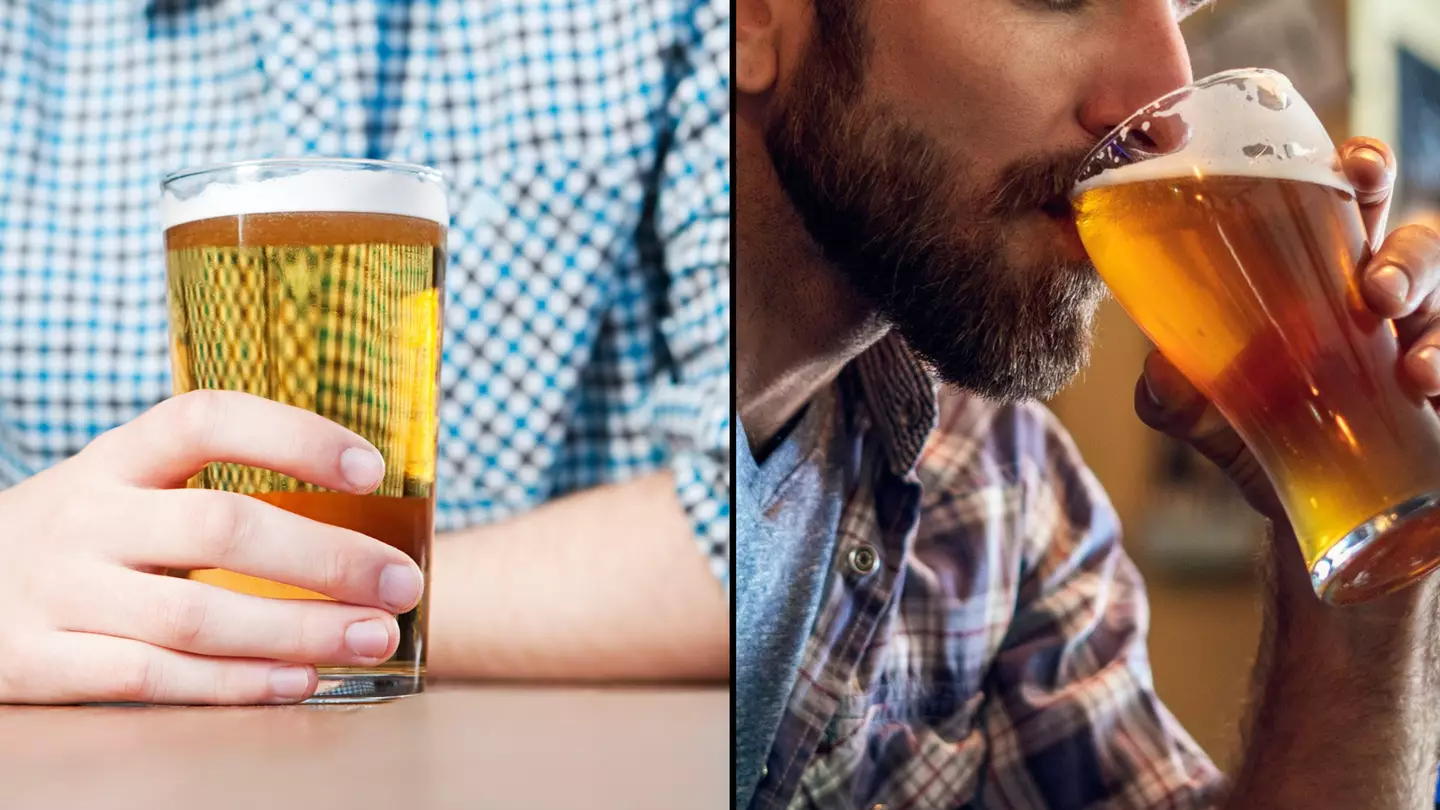Here are the signs to look out for while you’re enjoying yourself this Christmas
Here are four warning signs which could suggest you are falling into the alcoholic danger zone as Christmas approaches.
The festive season often goes hand-in-hand with excess and indulgence. In order to make up for the cold, wet and windy weather outside, most of us will spend our time enjoying tasty food and getting merry.
Chances are that most of us will likely drink more than usual during the holiday season, but are you worried you could be taking your drinking habits a little too far?

We all enjoy a drink at Christmas – but could you be at risk of falling to alcoholism? (Getty Stock Images)
Here are four warning signs which could mean you’re falling into the alcoholic ‘danger zone’.
Lack of routine
Lifestyle changes such as retirement or extended periods of time off can also leave people vulnerable to alcohol issues, as they seek to fill their time.
“In my experience as a therapist, I’ve seen unhealthy drinking habits accelerate after retirement,” councillor Andrew Harvey explained to The Telegraph.
“Lifestyle change is hard for most of us. Giving up a routine that’s been in place for decades can really shake people up.”
Habitual drinking
Another sign which could indicate that you’re sliding into an unhealthy relationship with alcohol is habitual drinking, which is were knocking back the booze finds itself entwined in your day-to-day activities.
“You get into a pattern of drinking the same way every day: a glass of wine while cooking dinner, a nightcap before bed,” The Priory’s Dr Niall Campbell told the outlet. “It can soon build.”
You prefer situations which involve drinking
As we’ve already mentioned, the Christmas holidays are seen by many as a time to drink a little bit too much and brush it off as enjoying themselves or letting their hair down.
Dr Alex George shares drinking advice
TikTok/dralexgeorge
0 seconds of 54 secondsVolume 90%
READ MORE: NINE WARNING SIGNS YOU’RE DEPENDENT ON ALCOHOL
EIGHT WARNING SIGNS YOU COULD BE A HIGH-FUNCTIONING ALCOHOLIC
However, this also means the endless roster of work parties, meet-ups at the pub and family gatherings can make it much harder to distinguish whether how dependant you are on the booze.
“Alcohol is often a bigger struggle in winter, partly because it’s so accessible and seen as a “warming” comfort on cold days, which can lead to more frequent drinking,” Jamie Giles, Director of Outpatient Services at Castle Health told LADbible.
“There’s also the social side of alcohol, with winter gatherings, parties, and pub outings making it easy to drink heavily.”
Using alcohol as an emotional crutch
One of the tell-tale signs that you’re drinking is moving into the danger zone is when you begin to use alcohol as a release rather than something to enjoy.

Here are four warning signs which indicate you could be falling into the alcohol ‘danger zone’ (Getty Stock Images)
People often find that reaching a stage of intoxication can help with stress and loosening their inhibitions, hence the phrase ‘drowning our sorrows’. However, the UK Addiction Treatment Centres states that once alcohol becomes a ‘key coping strategy’ you’re at a greater risk of developing alcoholism.
“When days are short, dark, and cold, people naturally start feeling lower, and for some, this season brings more anxiety or even depression,” Giles added.
“Alcohol often becomes a go-to for a quick warmth or mood boost.”Featured Image Credit: (Getty Stock Images)
Topics: Alcohol, Christmas, Food And Drink, Health, Mental Health

Brenna Cooper
Advert
Advert
Advert

Published 16:29 8 Jun 2024 GMT+1
Four questions could determine whether you’re functioning alcoholic if you answer ‘yes’ to every one
A psychiatrist has revealed the four questions you should ask yourself to determine whether you are a functional alcoholic

A psychiatrist has revealed the four questions you should ask yourself to determine whether you are a functional alcoholic.
Alcohol is a big part of our social lives, and if you’ve ever completed a dry Jan, you’ll know just how hard it can be to avoid giving into temptation.
Whilst you might not display the more serious signs of alcoholism, but sustain high levels of drinking, you might be what is known as a functional alcoholic.

Have you ever thought your drinking is a cause for concern? (Sally Anscombe / Getty Images)
Dr Iqbal Mohiuddi, a consultant psychiatrist at 25 Harley Street Day Clinic, has revealed four easy questions you can ask yourself, and if the answer to all four is ‘yes’, there might be something worth addressing.
In fact, talking to Healthista Dr Iqbal said: “If one or two of those are answered positively, it’s highly suggestive you could have a problem with alcohol.”
So, what are they?
C – Cutting down: Have you ever thought you should cut down on your drinking?
A – Annoyance: Do you ever get annoyed or angry when people tell you about your drinking?
G – Guilt: Do you feel guilty about your drinking or any aspect of its effects on yourself or other people?
E – Eye-opener: Do you feel the need to have a drink to feel better, especially in the mornings to calm your nerves.

If you answered yes to all four questions then you might be a functioning alcoholic. (krisanapong detraphiphat / Getty Images)
Despite the warning, Dr Iqbal did note that these questions aren’t there to scare you, as your answer may be ‘yes’ without there being a problem at all.
The key is being aware and taking into consideration when it might be or become an issue.
He added: “The tipping point is usually when someone loses, or faces a very real fear of losing, someone they love because of their drinking.
“It’s almost always the thing that brings people to us.”
The psychiatrist noted that being honest with yourself is the first step, and then actions from there can look like a daily diary tracking your habits, analysing drunken behaviour, and most importantly seeking help from professionals.
Dr Iqbal does explain that the odd white lie to your doctor here and there about how many units of alcohol you consume is not a big deal.
Let’s be real, we’ve all been there.
But keeping an eye on problems developing and dependency, is where the real issues lie.
Please drink responsibly. If you want to discuss any issues relating to alcohol in confidence, contact Drinkline on 0300 123 1110, 9am–8pm weekdays and 11am–4pm weekends for advice and supportFeatured Image Credit: Getty Stock Photos
Topics: Alcohol, Food And Drink, Health, Mental Health

Mia Williams
Advert
Advert
Advert

Updated 16:34 27 Oct 2024 GMTPublished 12:17 27 Oct 2024 GMT
Addiction expert reveals sign you may be functioning alcoholic which can be spotted during the weekend
Addiction expert Nuno Albuquerque revealed how you can spot someone struggling

Warning: This article contains discussion of alcoholism which some readers may find distressing.
The weekend is a time to rest, recharge and enjoy some leisure time with your loved ones – and for a lot of people, this involves heading to the nearest boozer and sinking a few.
There’s no harm in having a catch-up with your pals over several cheeky pints, but while you’re doing so, you might want to keep an eye on just how many you are all putting away.
That’s because your visit to the pub might help you pick up on signs that you, or one of your nearest and dearest, are actually a ‘functioning alcoholic‘ who has an unhealthy relationship with alcohol.
Steve-O explains why he’s ‘grateful’ to be an alcoholic
Credit: Graham Bensinger/YouTube
0 seconds of 1 minute, 50 secondsVolume 90%
Addiction expert Nuno Albuquerque has detailed all of the red flags you should look out for to spot a ‘functioning alcoholic‘ who might let their mask slip while they are letting their hair down over the weekend, as well as sharing his advice for how you can help them.
The counsellor has helped a host of patients overcome their dependency issues and has nearly two decades of experience working with UK Addiction Treatment Centres.
He believes that alcoholism, in any form, ‘stems from trauma‘ and that there is ‘always an underlying reason for addiction’ – but when it comes to those who remain high-functioning, he says we can only kickstart their road to recovery by ‘understanding what drives people to’ it.
What is a high-functioning alcoholic?
A high-functioning alcoholic is a person who might not fit the typical stereotype of someone struggling with an addiction as they are so good at concealing it and keeping their lives in order.
Albuquerque defines it as someone with ‘an addiction to alcohol but manages to go about their daily routine, therefore their drinking problem goes unseen’.
“It may be surprising to know that your friend, who has a good and stable job, pays their bills, and is friendly and social, is secretly battling alcoholism,” he explained. “This is what is commonly referred to as a high-functioning alcoholic, and most alcoholics are not able to sustain this way of living for very long.”

Keep an eye out for the signs of a high-functioning alcoholic while in the pub on the weekend (Getty Stock Image)
Self-proclaimed former ‘high-functioning alcoholic’ Julie McFadden previously spoke out about the double life she was leading while keeping her struggle with booze under wraps.
She explained she didn’t drink every day, still had a job, and had never been to jail, so those closest to her ‘would not have considered her an alcoholic’.
What are the signs of a high-functioning alcoholic?
As we mentioned, a high-functioning alcoholic can be hard to recognise due to their ability to keep all of the plates in their life spinning.
However, while you are enjoying a tipple over the weekend, there are a few red flags you can look out for.
You can begin by taking notice of certain traits that your friend might display, as a lot of high-functioning alcoholics often follow the same pattern.
Albuquerque explains that people who end up on this road often have problems in their personal lives which they want to numb, or a high-pressured job that they need to escape from.
But their behaviour can also be a cry for help – so if someone is ‘constantly justifying their drinking habits’ and ‘can’t just have one’, the expert reckons these are signs that they need some assistance.
He said: “High-functioning alcoholics may not act as you would expect, as they can continue working and running a family home without their alcohol abuse affecting their outward performance.
“In addition, many people wouldn’t associate themselves with having a drinking problem.
“However, this type of denial can creep up on those affected for years and, in the process, can severely damage a person’s relationships as well as their mental and physical health.”

Addiction expert Nuno Albuquerque explained it can be a difficult for people to pick up on it (Getty Stock Image)
How does someone become a high-functioning alcoholic?
Although most of us couldn’t imagine getting through the working day while feeling buzzed from the booze, high-functioning alcoholics often turn to the stuff to help them plough on.
The addiction expert reckons there are a myriad of reasons which can result in someone relying on alcohol in this way and shared his thoughts on how this happens.
Albuquerque explained: “Life can sometimes feel stressful and painful situations can arise. For high-functioning alcoholics, drinking may offer temporary relief.
“Other people with alcoholism may find themselves in financial difficulty, or maybe they’re experiencing relationship problems. It can be difficult to express or handle our feelings, so people may use alcohol to ‘numb the pain’.
“Furthermore, suppose you have responsibilities such as a job or children to take care of.
“In that case, you may use alcohol as a clutch to give you a perceived sense of strength to get through hard times.”
However, he wants people to know that booze isn’t the answer to overcoming these stresses in life, even if it doesn’t seem to be getting in the way of your daily tasks – and believe it or not, there is light at the end of the tunnel.
So if you are struggling or spot any signs that your mates might be, it’s crucial that you seek some help.
Please drink responsibly. If you want to discuss any issues relating to alcohol in confidence, contact Drinkline on 0300 123 1110, 9am–8pm weekdays and 11am–4pm weekends for advice and support.Featured Image Credit: Getty Stock Images
Topics: Alcohol, Food And Drink, Health, Lifestyle, Mental Health

Olivia Burke
Advert
Advert
Advert

Updated 16:49 2 Jun 2024 GMT+1Published 16:44 2 Jun 2024 GMT+1
Sign you may be functioning alcoholic can be seen in pub as summer begins in UK
If you think you could be struggling with alcohol, here is one sign to look out for

An expert has revealed the one sign to look out if you’re concerned that you might be a high-functioning alcoholic.
As the weather (finally) begins to warm up across the UK, most of us will be heading out to enjoy the sunshine with a cold pint in a pub garden.
After all, 1 June signals the start of the summer months.
But are you aware of the signs that your drinking could be turning into a problem rather than something to enjoy responsibly?
.jpg)
Summer offers up plenty of opportunities for drinking. (Getty Stock Image)
If you’re that you may becoming too reliant on your evening tipple an addiction expert has shared the key sign that you or a friend could be a high-functioning alcoholic – and it’s something that you can spot at the pub.
Now most of us are probably guilty of taking drinks with friends a little too far every now and again, however if you’re drinking heavily too often it can be a sign that you could be developing a problem.
What is a high-functioning alcoholic?
According to guidelines issued by the UK Addiction Treatment Centres, a functioning alcoholic is a ‘person with an addiction to alcohol, but manages to go about their daily routine, therefore their drinking problem goes unseen’.

High-functioning alcoholism is often hard to spot. (Getty Stock Image)
Key sign of someone being a high-functioning alcoholic
If you’re concerned that your drinking habits could be becoming unhealthy, here is one simple sign you should be wary of.
According to the expert, the tell-tale sign of functional alcoholism is being unable to call it quits after one drink and instead finding excuses to stay out all night.
“Initially, they intend that they will just have one or possibly two, and they may sincerely wish to believe this and tell others in your company to reaffirm this belief,” the expert writes.
“But one will always turn into more as they will inevitably find an excuse to continue drinking, whether it be another round, chatting to a new person, or an offer on beverages such as ‘happy hour’.”

High-functioning alcoholics are sometimes aware of their behaviour. (Getty Stock Image)
The expert went on to add that as a high-functioning alcoholic you may be aware of the issues in your relationship with drinking but could potentially make excuses to avoid talking about it due to ‘deep rooted anxiety‘.
Justifications often made by high-functioning alcoholics often include phrases such as ‘I work so hard. I am entitled to have fun’ or ‘ pay the bills, take my kids to school, and get to work on time. Alcoholics can’t do those things’.
If you relate to any of the topics in this article, support can be found on Drinkline on 0300 123 1110. The confidential service is available 9am–8pm weekdays and 11am–4pm weekends for advice and support.Featured Image Credit: Getty Stock Images
Topics: Alcohol, Health, Food And Drink

Brenna Cooper
Advert
Advert
Advert

Updated 16:42 12 Apr 2024 GMT+1Published 16:37 12 Apr 2024 GMT+1
Six signs you’re a borderline alcoholic and need to cut back as Brits get ready for summer
Without realising, you might be on the edge of consuming a little too much

By now, we are all aware that drinking excessively can’t be a good a thing.
As a non-drinker, I have no issue with my friends knocking down a few cold ones after work and I will often join them – with a very exciting Diet Coke.
However, I can’t help but notice that when the weather gets nicer, life gets better, particularly in the UK.
But with the Sun beaming and the drinks flowing, without realising, you might possibly be on the edge of consuming a little too much.
That’s why it’s probably worth keeping a look out for these six signs in the lead-up to summer, as advised by an NHS doctor.

In 2021, 49 percent of UK adults drank alcohol on at least one day per week. (Getty Stock Image)
What is an alcoholic?
According to the NHS, ‘alcohol misuse is when you drink in a way that’s harmful, or when you’re dependent on alcohol’.
The health service advises people to not regularly drink more than 14 units a week.
One unit of alcohol is 8g or 10ml of pure alcohol, which is about half a pint of lower to normal-strength lager/beer/cider (ABV 3.6 percent), a single small shot measure (25ml) of spirits (25ml, ABV 40 percent), or a small glass (125ml, ABV 12 percent) of wine containing about 1.5 units of alcohol.
Six signs you’re a borderline alcoholic and need to cut back
1) You drink alcohol every day without thinking about it
According to the National Institutes of Health (NIH), ‘people like to drink alcohol because of its ability to alter emotional states’.
They say that alcohol ‘induces euphoria, relaxation, and disinhibition while reducing stress and anxiety’.
2) You binge-drink regularly
Dr Dave Nichols, an NHS GP, told The Sun that alcoholism is when a person has an uncontrollable desire to drink.
“Their body is dependent on alcohol,” he said.
3) You only socialise where drink is involved
If the only reason you’re going to the staff party is for the free booze, then perhaps you need to find more interesting colleagues.

With the sun beaming and the drinks flowing, without realising, you might possibly be on the edge of consuming a little too much. (Getty Stock Image)
4) You drink regularly during the day
“Alcoholics will usually develop physical and psychological symptoms if they stop drinking,” Dr Nichols explained.
“Borderline alcoholics might experience symptoms such as abdominal pain, stress, anxiety, bad skin, trouble sleeping, irritability and higher blood pressure.”
5) You find it annoying when others are not drinking
Often, if I go on a night out, 99 percent of the people aren’t at all bothered with the fact that I don’t drink.
But occasionally, there will always be that one person who has a slight issue with it.
Perhaps a look at one’s self would be more appropriate.
6) You drink more than the NHS guidelines every month.
As mentioned, the NHS guidelines advise not to regularly drink more than 14 units a week.
Dr Nichols warned: “The most common long-term physical impacts of borderline alcoholism are abnormal liver function, cardiovascular disease, diabetes and mental health problems, but these are often hidden diseases and patients are unaware of them until they progress.”
Please drink responsibly. If you want to discuss any issues relating to alcohol in confidence, contact Drinkline on 0300 123 1110, 9am–8pm weekdays and 11am–4pm weekends for advice and support.